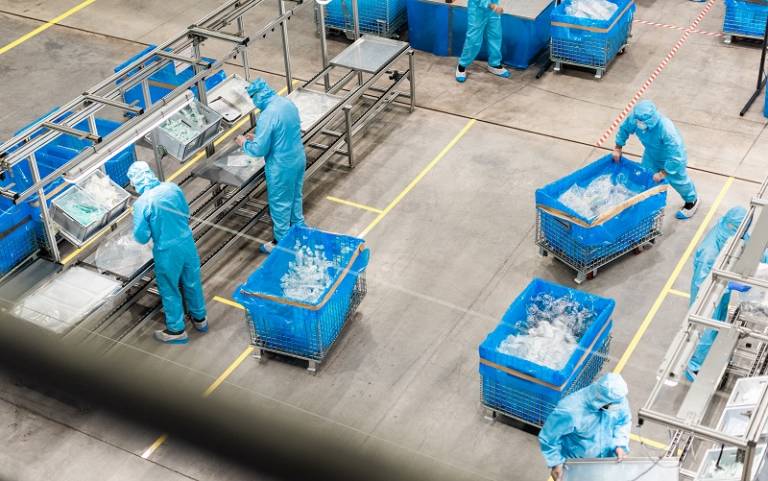Over 1,000 UCL-Venturas sent to India and Nepal
8 June 2021
UCL has sent a total of 1,160 breathing aids to India and 130 to Nepal to support the countries’ fight against a Covid-19 surge.

The UCL-Ventura CPAP breathing aid was first sent to India in April as part of a UK Government shipment of 600 devices including ventilators and oxygen concentrators, to be delivered to hospitals in the worst hit parts of the country.
Since then, holistic supply partner G-TEM has packaged and transported hundreds of devices from their warehouse in Gloucestershire, often within just 24 hours, to be flown to Delhi and Nepal.
Professor Rebecca Shipley (UCL Institute of Healthcare Engineering) said: “The UCL-Ventura team developed the breathing aid to help those in the most need, and I’m so pleased we are able to include it in emergency aid shipments to ensure hospitals in India and Nepal have access to it.
“I’m hugely grateful to our logistics partner G-TEM for arranging shipments at short notice. We are committed to continuing to support the global Covid-19 response and working with our partners around the world to do this.”
Cases of Covid-19 are falling in India, but the country still has over one million current cases as of today (8 June), and has had nearly 29 million in total.
Nepal has also experienced a recent surge in cases, and the 130 devices shipped there are being distributed to hospitals around the country.
The UCL-Ventura is a Continuous Positive Airway Pressure (CPAP) device, which is non-invasive and helps to keep patients off mechanical ventilators. It is quick to produce and easy for staff to learn how to use.
CPAPs were used extensively in the first waves in Italy and China, preventing around 50% from progressing to mechanical ventilation, which requires sedation. The UCL-Ventura model is in use in hospitals in at least 15 countries around the world.
Engineers at UCL and Mercedes-AMG HPP worked round the clock with clinicians at UCLH to reverse engineer CPAPs during the UK’s first lockdown as they were in short supply in hospitals. It took fewer than 100 hours from the initial meeting in March 2020 to production of the device. Since their mass manufacture, use of mechanical ventilation in UK hospitals has fallen by 26% and intensive care stay has halved for survivors.
The plans and details required to make the device were also made available for manufacturers to download at no cost. Within just two days, nearly 700 requests to access the information had been approved for manufacturers, non-profits, health experts and research institutes in 25 countries.
The UCL-Ventura team has worked with charities including the International Medical Education Trust (IMET2000) and Medical Aid for Palestinians (MAP) to support distribution and manufacture around the world. Around 3,000 components of the kit have been delivered to countries by G-TEM.
Links
- UCL is joining fundraising activities to help send more UCL-Venturas to those in need
- CPAP orders approved by country, correct to November 2020
- Professor Rebecca Shipley's academic profile
- UCL-Ventura
- UCL Institute of Healthcare Engineering
- UCL Mechanical Engineering
- UCL Engineering
- Professor Mervyn Singer's academic profile
- UCL Medical Sciences
- UCLH
- Mercedes-AMG High Performance Power Trains
- IMET2000
Image
- Credit: James Tye
- Photos available to download
Media contact
Kate Corry
Tel: +44 (0)20 3108 6995
Email: k.corry [at] ucl.ac.uk
 Close
Close

